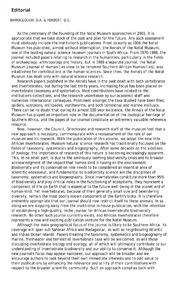
Editorial PDF
Preview Editorial
Editorial BARRACLOUGH, D.A. & HERBERT, D.G. As the centenary of the founding of the Natal Museum approaches in 2003, it is appropriate that we take stock of the past and plan for the future. Any such assessment must obviously include the institution's publications. From as early as 1906 the Natal Museum has published, almost without interruption, the Annals of the Natal Museum, one of the leading natural science museum journals in South Africa. From 1970-1988, the journal included papers relating to research in the humanities, particularly in the fields of archaeology. anthropology and history, but in 1989 a separate journal, the Natal Museum Journal of Humanities (now to be renamed Southern African Humanities), was established for contributions in the human sciences. Since then, the Annals of the Natal Museum has dealt only with natural science research. Research papers published in the Annals have in the past dealt with both vertebrates and invertebrates, but during the last thirty years, increasing focus has been placed on invertebrate taxonomy and systematics. Most contributions have related to the institution's collections, and the research undertaken by our academic staff and numerous international colleagues. Prominent amongst the taxa studied have been flies, spiders, scorpions, millipedes, earthworms, and both terrestrial and marine molluscs. There can be no doubt that during its almost 100 year existence, the Annals of the Natal Museum has played an important role in the documentation of the zoological heritage of Southern Africa, and the pages of our journal constitute an extremely valuable reference resource. Now, however, the Council, Directorate and research staff at the museum feel that a new approach is necessary, commensurate with a reassessment of the role of our museum and its research. With the publication of this volume, we adopt the new title African Invertebrates. Museum natural science research has traditionally focussed on the fields of taxonomy, systematics and biogeography. After some decades on the sidelines of zoology, the importance of research of this nature is becoming increasingly apparent. This, in no small part, is due to the ominously looming biodiversity crisis and to broader acknowledgment of the impact that human-kind is having on the environment. Biodiversity and its conservation now needs to be considered an essential area of scientific endeavour, and fundamental to biodiversity science are the disciplines of taxonomy, systematics and biogeography. Since invertebrates constitute more than 95% of biodiversity and play critical roles in the functioning of ecosystems, they represent a component of life on Earth that is essential to the future well-being of the planet and of human-kind. Yet invertebrates, because of their generally small size and bewildering diversity, remain the most poorly known component of the Earth's biota. It is therefore eminently appropriate that our journal should now restrict itself to these animals. In so doing we are stepping away from the traditional in-house publication, with the intention of establishing a high-quality, niche journal for African invertebrate biodiversity research. No other such journal currently exists, and African Invertebrates therefore represents a new and exciting publication venture for the Natal Museum. Although the main geographical focus of the journal is likely to be Southern Africa. its coverage will span sub-Saharan Africa and Madagascar, as well as neighbouring Atlantic and Indian Ocean islands. Papers treating the taxonomy, systematics and biogeography of marine, freshwater and terrestrial invertebrate taxa will be welcomed, as will those discussing invertebrate biology and ecology, all of which will ultimately contribute to our understanding of invertebrate biodiversity and our ability to conserve it. Although the new journal's focus may appear narrower, our approach will be broader and we encourage authors to look beyond their own immediate interests and to add value to their publications by enhancing the relevance and utility of their contributions with respect to the broader scientific community. Such an approach complies both with internationally recognised needs and with the South African government's desire to promote scientific collaboration and interdisciplinary research. To cite this paper: Barraclough, D.A. & Herbert, D.G. 2001. Editorial. African Invertebrates 42: i-ii.
